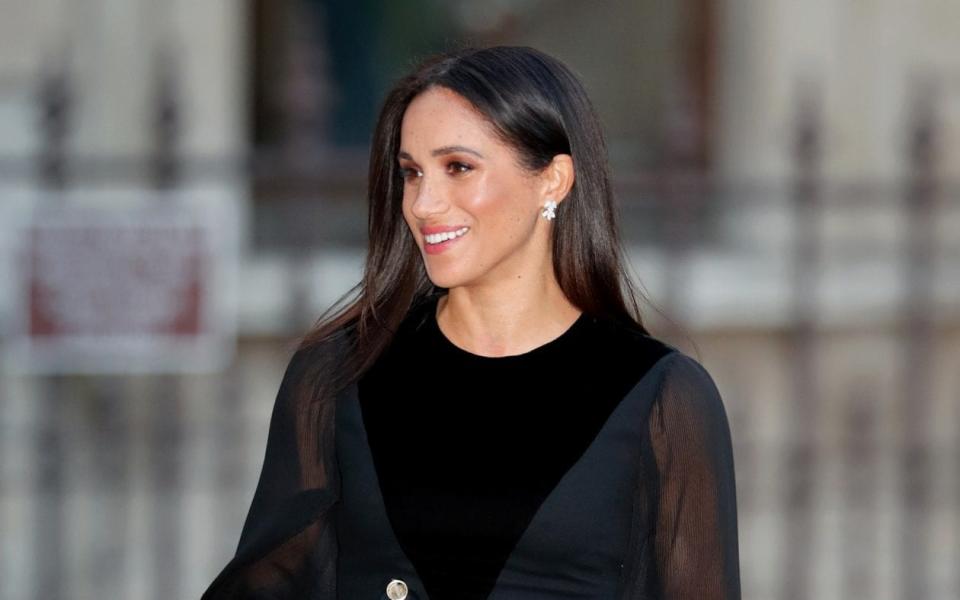Why Meghan is a millennial hero

It’s the fairytale that every girl of my generation grew up with: the prince falling for the cool, independent ‘just like us’ woman in jeans, and then going on to marry her against all the odds. For millennials like myself, fed on a diet of Disney movies followed by The Princess Diaries and The Prince & Me, not to mention The Prince & Me 2, Harry and Meghan’s story was the fairytale we already knew off by heart.
And most of us were already predisposed to Team Meghan. As a strong, black, independent woman who’d carved out a successful career of her own before even meeting Harry, she was everything we admired. Her marriage was the breath of fresh air the Royal family needed, the boost of modernity that would make this British institution finally relatable to younger generations as well as people of colour; proof that long overdue diversity had filtered through.
So as time passed by, and the tabloid headlines moved on from racism (describing her mother, Doria as ‘(almost) Straight Outta Compton’ and discussing her ‘exotic DNA’) to pedantic double standards, accusing her of ‘breaking royal protocol’ for doings things that, by contrast, the Duchess of Cambridge was seemingly praised for doing (everything from wearing wedges to crossing her legs, guest editing a magazine and cradling her baby bump), my generation watched in sympathetic shock.
It seemed like no matter what, Meghan could never win. Her Grenfell charity cookbook was claimed to have ‘terrorist’ links, her (and our) love of avocados was blamed for mass murder, and every time Harry expressed a slightly woke opinion, she was accused of the sexist and insulting crime of making him her puppet.
When the Duke and Duchess of Sussex announced they were leaving the Royal family, to create their own Happy Ever After, it was not a surprise. If anything, it was the perfect 21st century fairytale ending. It was never going to be easy, and the hatred they’ve garnered for it has been immense, but my generation applauded their decision. Now, Meghan has effectively stood up to the oldest British institution, chosen her own happiness and that of her family over outdated duties and traditions, and – the ultimate Gen Y goal – decided to live her life on her own terms.
Not everyone sees it this way, least of all my own mother. While my generation is more inclined to be sympathetic towards Meghan, baby boomers like my 60-year-old mum are (much) less forgiving. “It’s the way she went about it. I just don’t think Meghan gave it enough of a chance. Being a Royal is a job, and you have to go by their rules. I personally think she should have stood back and observed instead of airing their dirty laundry in public too soon.”
Most of my friends’ mums feel the same way, believing Meghan knew what she was getting into – something the duchess addressed in her interview, admitting she was “naive” – with some even viewing her as a ruthless operator who dug her nails into Harry, with the intention of eventually persuading him to leave the Royal family to move back to America and make billions.

It isn’t that my generation dislikes the Royal family. There are some who believe they are irrelevant, but most of my friends feel the way I do: we appreciate what they do for Britain but we hold them to the same standards we do all institutions, in expecting them to be tolerant, supportive and understanding. Only, it seems their treatment towards Meghan, who claims she received a lack of support for her mental health while a member of the Royal family expressed “concerns” about how “dark” Archie’s skin would be, has been anything but.
Their decision to speak to Oprah has been heavily criticised, both in terms of hypocrisy after their claims they left The Firm for privacy, and also for disregarding the culture of the Royal family. But to me, it’s the ultimate act of courage. After years of having to stay silent, Harry and Meghan have chosen to share their side of the story and – millennial parlance alert – speak their truth. Much like Diana, Princess of Wales, they’re reclaiming control of their narrative and accepting the heavy consequences that come with it.
It still remains to be seen whether their interview will dramatically change public opinion, particularly here in Britain, but if my mum is anything to go by, it has already made an impact. “It’s hard to know what to believe now, with the story being turned around and Meghan saying things like it was Kate who made her cry, not the other way around,” she muses. “It all can’t have been easy for her. I think I’ve become neutral now. I no longer know what to believe. Although I didn’t like Harry saying his dad stopped taking his calls. That’s a personal matter between the family.”
It’s no surprise that generational reactions to Harry and Meghan differ; older generations value privacy much more than those of us who have grown up oversharing on social media, and their love for duty is equal to our respect for breaking mental health taboos. But in the same way that Diana was so widely admired by women of her generation who related to her relationship and mental health struggles, Meghan will always find support in her own generation – particularly from women of colour who know what it’s like to face racist comments that white people often can’t recognise, strong women who are labelled bullies for being assertive, and above all, any woman who has ever had to carve out her own happy ending.

